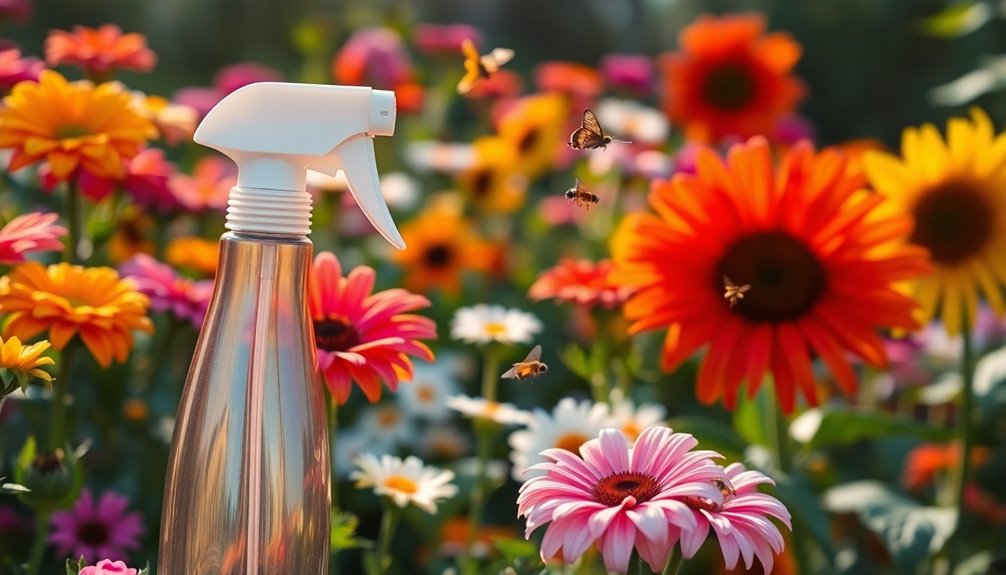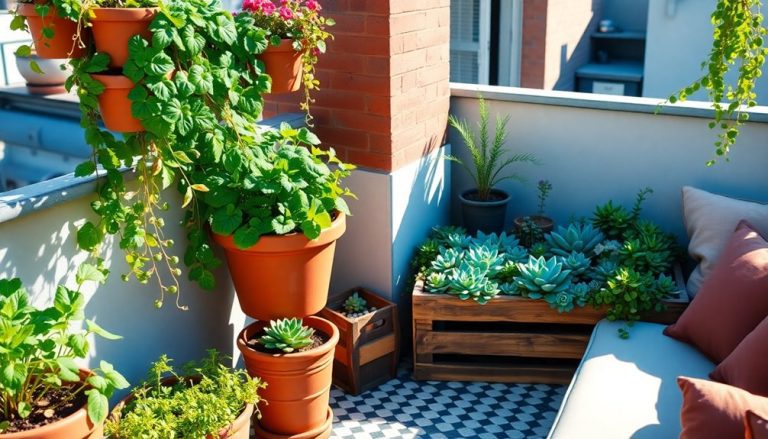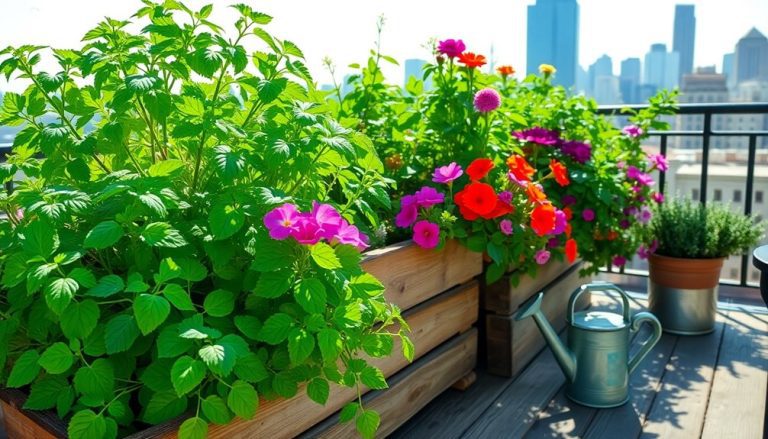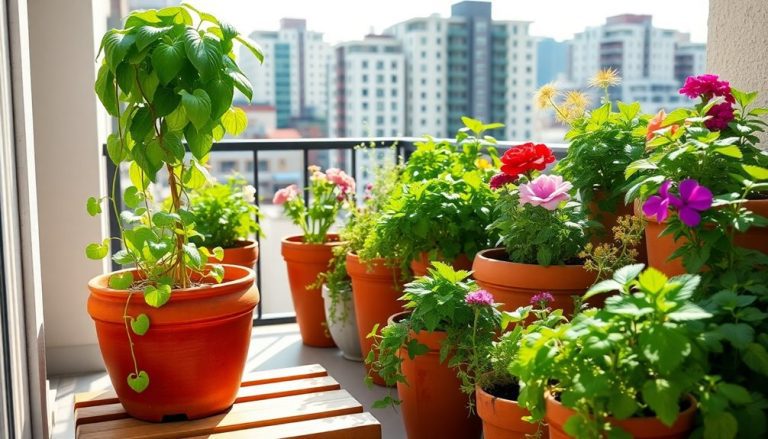To keep your flower garden thriving, effective insect repellents are essential. Natural options like neem oil, garlic spray, and peppermint oil work wonders in deterring pests. You can easily make these remedies at home. For tougher infestations, consider eco-friendly commercial sprays that won't harm beneficial insects. Apply repellents during calm times, especially on the undersides of leaves where pests hide. Reapply after rain to maintain effectiveness. By combining these methods, you'll protect your blooms while maintaining a healthy ecosystem. Curious about more strategies to enhance your gardening success? Keep exploring!
Key Takeaways
- Neem oil disrupts insect growth and repels various pests, making it a highly effective natural option for flower gardens.
- Garlic spray, created by blending garlic with water, serves as a strong-smelling deterrent for a range of insects.
- Peppermint oil diluted with water effectively repels ants and spiders, providing a fragrant and natural solution for pest control.
- Diatomaceous earth is a powder that kills soft-bodied insects on contact, offering immediate protection for your flowers.
- Commercial insect repellents with eco-friendly ingredients, like citronella, are safer for beneficial insects while providing effective coverage against pests.
Understanding Garden Insect Pests
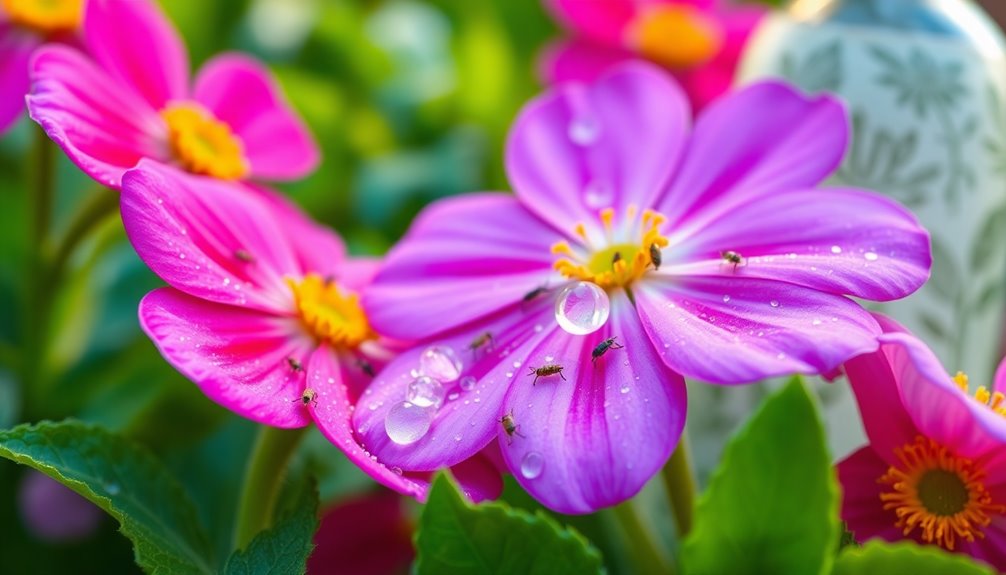
In any flower garden, understanding garden insect pests is crucial for maintaining a healthy environment. You'll encounter a variety of pests that can threaten your blooms. Common culprits include aphids, spider mites, and caterpillars. Recognizing these pests early helps you take action before they cause significant damage.
Aphids, tiny and green or black, cluster on new growth, sucking sap and weakening plants. Spider mites are barely visible but leave fine webs and stippling on leaves. Caterpillars can munch through foliage quickly, so spotting them is essential. Effective pest control solutions can provide you with the necessary tools to combat these pests effectively.
You should also keep an eye out for beneficial insects like ladybugs and lacewings, which can help control pest populations naturally. Monitoring your garden regularly allows you to identify pest problems before they escalate.
Look for signs of damage, such as yellowing leaves or distorted growth, and check the undersides of leaves where pests often hide. Incorporating insect-repelling plants into your garden can also help deter these pests naturally.
Natural Insect Repellent Options
When it comes to protecting your flower garden from pests, natural insect repellents offer effective and eco-friendly solutions. These alternatives not only keep harmful insects at bay but also safeguard beneficial ones. You'll appreciate how easy it's to create and use these natural repellents right in your garden.
Here are some popular natural insect repellent options you can try:
- Neem Oil: Derived from the seeds of the neem tree, this oil disrupts insect growth and repels various pests. Using it in conjunction with pest traps can enhance its effectiveness.
- Garlic Spray: Mixing garlic with water creates a strong-smelling spray that deters many insects.
- Peppermint Oil: Both fragrant and effective, peppermint oil can repel ants, spiders, and other pests when diluted and sprayed.
- Diatomaceous Earth: This powdery substance is made from fossilized algae and can kill soft-bodied insects when they come into contact with it.
- Citrus Peels: Placing citrus peels around your garden can deter pests due to their strong scent.
Additionally, using these natural repellents can enhance the overall health of your garden by promoting biodiversity in ecosystems, which is crucial for maintaining a balanced garden environment.
Commercial Repellents Overview
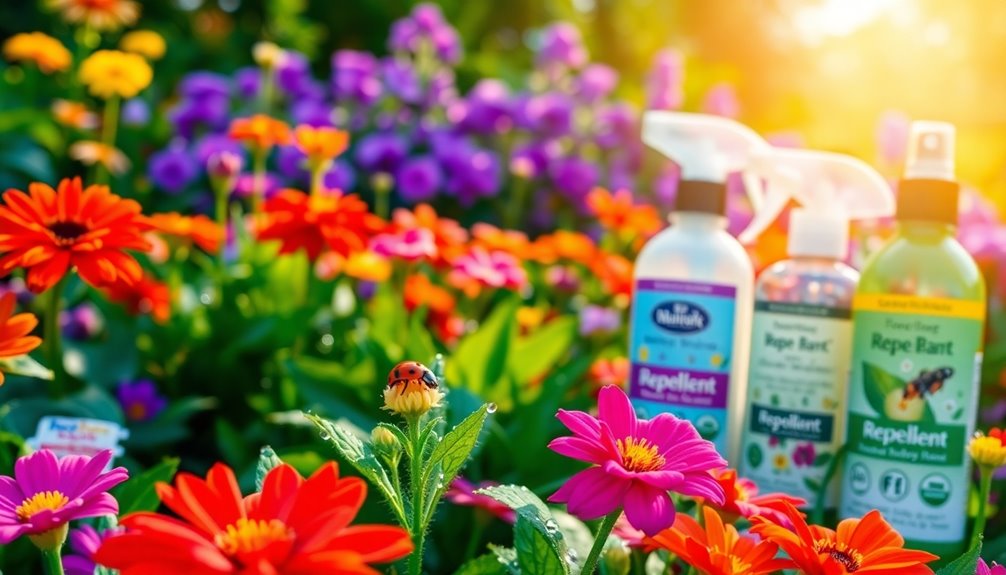
Exploring commercial insect repellents can provide you with a variety of effective options for protecting your flower garden. These products are specifically formulated to deter a wide range of pests, including aphids, beetles, and mosquitoes, ensuring your blooms stay healthy and vibrant.
When choosing a commercial repellent, you'll encounter sprays, granules, and concentrated solutions. Sprays offer immediate coverage and are easy to apply, while granules can provide longer-lasting protection by targeting soil-dwelling pests. Concentrated solutions often require dilution but can be more economical for larger gardens.
Many commercial repellents contain synthetic ingredients, such as DEET or permethrin, which are highly effective but may raise concerns about environmental impact. Fortunately, there are also eco-friendly options available, derived from natural ingredients like citronella or eucalyptus oil. These products can be just as effective while being gentler on beneficial insects.
Always read the label carefully to ensure the repellent is safe for your specific flowers and follow application instructions closely. Additionally, consider using fertilizer spreaders to enhance the overall health of your garden, as they help distribute nutrients evenly.
With the right commercial insect repellent, you can enjoy a flourishing garden free from unwanted pests.
Homemade Repellent Recipes
Creating your own homemade insect repellents can be a rewarding and effective way to protect your flower garden. Not only do these recipes help keep pests at bay, but they also use natural ingredients, making them safe for your plants and the environment.
Here are some simple recipes you can try:
- Garlic Spray: Blend a few cloves of garlic with water, strain, and spray on your plants. The strong scent deters many insects.
- Peppermint Oil: Mix a few drops of peppermint essential oil with water and a little dish soap. This combination is a great repellent for ants and spiders.
- Vinegar Solution: Combine equal parts vinegar and water in a spray bottle. This mixture is effective against aphids and other soft-bodied insects.
- Cayenne Pepper Spray: Dissolve a tablespoon of cayenne pepper in a quart of water and spray on affected areas. It's a natural deterrent for a variety of pests.
- Neem Oil: Dilute neem oil with water and spray on your plants. This natural pesticide disrupts the life cycle of many garden pests.
Give these recipes a try, and enjoy a thriving, pest-free flower garden!
Application Techniques and Tips
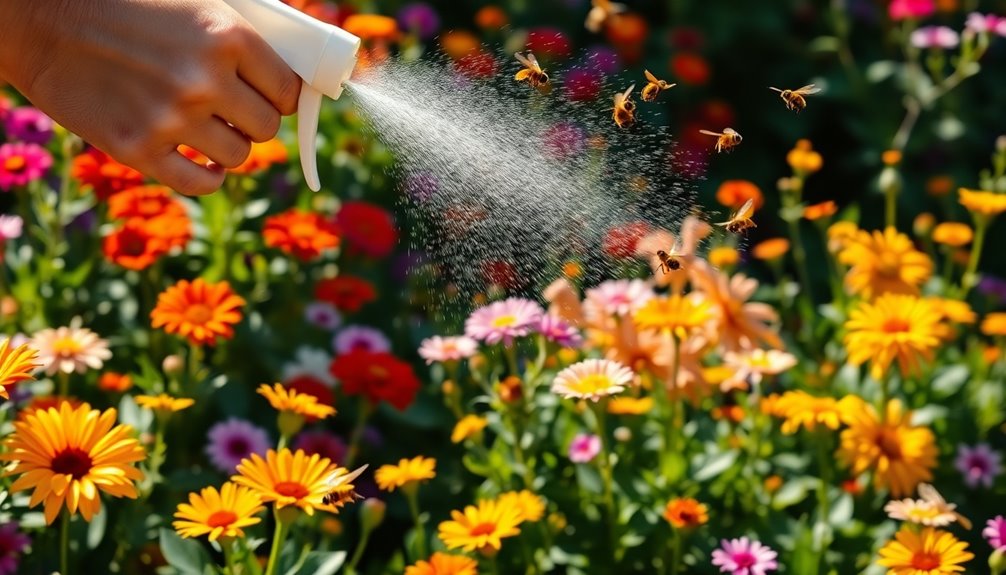
Maximizing the effectiveness of your homemade insect repellents involves using the right application techniques. Start by choosing a calm day for application; wind can carry the repellent away from your target areas. Ensure the plants are dry before you spray, as moisture can dilute the repellent and reduce its effectiveness.
When applying, aim for the undersides of leaves and the base of plants, as this is where many pests like to hide. Use a spray bottle or a garden sprayer for even coverage, ensuring you don't saturate the foliage, which could lead to leaf burn.
It's also wise to apply in the early morning or late afternoon when beneficial insects are less active. Reapply your repellent after heavy rain, as it can wash away.
For long-lasting protection, consider using a combination of repellents, rotating them every few weeks to prevent pests from building up a resistance. Finally, always test a small area of your plants first to ensure there's no adverse reaction, allowing you to enjoy a thriving, pest-free garden!
Preventative Measures for Gardens
A healthy flower garden starts with effective preventative measures that deter pests before they become a problem.
By taking proactive steps, you can maintain the beauty of your flowers while minimizing the risk of infestations.
Here are some essential tips to keep pests at bay:
- Choose native plants: Native plants are better adapted to your local environment and often have natural resistance to pests.
- Rotate crops: Changing the location of your plants each season can disrupt pest life cycles and reduce infestations.
- Maintain healthy soil: Healthy soil boosts plant immunity. Use compost and organic fertilizers to enhance soil quality.
- Encourage beneficial insects: Attract ladybugs, lacewings, and other beneficial insects that prey on harmful pests by planting a variety of flowers.
- Regularly inspect your plants: Keep an eye out for signs of pests or diseases. Early detection can prevent more significant problems later.
Benefits of Integrated Pest Management
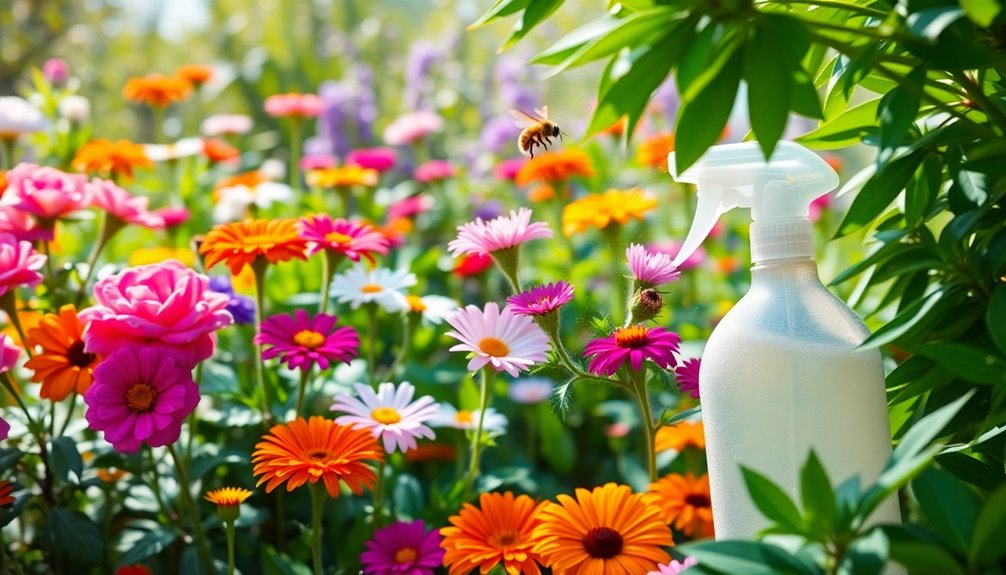
Integrated Pest Management (IPM) offers a holistic approach to maintaining a vibrant flower garden while effectively controlling pests. By combining cultural, physical, biological, and chemical strategies, you can create a balanced ecosystem that minimizes pest damage while promoting plant health. This method reduces reliance on harsh chemicals, making it safer for you, your plants, and beneficial insects.
One of the key benefits of IPM is its sustainability. By focusing on long-term solutions rather than quick fixes, you'll encourage natural predators and beneficial organisms that help keep pest populations in check. Additionally, IPM promotes biodiversity, which enhances your garden's resilience against pests and diseases.
You'll also find that IPM can save you money. By preventing pest problems before they escalate, you'll reduce the need for costly treatments and replacements. Plus, the techniques you learn can apply to future gardening efforts, making your skills even more valuable over time.
Incorporating IPM principles not only helps you maintain a beautiful flower garden but also fosters a healthy environment. So, embrace this approach and watch your garden thrive sustainably!
Frequently Asked Questions
Are Insect Repellents Safe for Beneficial Insects Like Bees?
Insect repellents can harm beneficial insects like bees if misused. You should choose products specifically designed to minimize impact on these creatures, applying them carefully to protect your garden's ecosystem while keeping pests at bay.
How Often Should I Reapply Insect Repellents?
You should reapply insect repellents every few hours, especially after rain or heavy sweating. Always check the product instructions, as some formulations may require more frequent application for optimal effectiveness against unwanted pests.
Can I Use Insect Repellents on Edible Plants?
About 30% of insect repellents can harm edible plants. You should avoid using conventional insect repellents on your fruits and vegetables. Instead, opt for natural alternatives to protect your garden without compromising your food safety.
What Are the Signs of Insect Repellent Effectiveness?
You'll notice insect repellent effectiveness by observing fewer insect bites, reduced pest activity, and healthier plants. If your garden thrives without visible insect damage, it's likely the repellent's working as intended. Keep monitoring regularly!
Do Insect Repellents Expire or Lose Potency Over Time?
You might not realize it, but insect repellents can indeed expire. Over time, their potency diminishes, leaving you unprotected against pesky bugs. Always check the expiration date to ensure you're getting the best defense possible.
Conclusion
By embracing effective insect repellents, you're not just protecting your flower garden; you're nurturing a vibrant, thriving ecosystem. Remember, each bloom is a testament to your dedication, and with the right strategies, you can keep pests at bay while letting beauty flourish. Whether you choose natural options or homemade recipes, your efforts can turn your garden into a sanctuary. So, roll up your sleeves and watch your flowers dance joyfully in the sun, free from unwanted guests!

